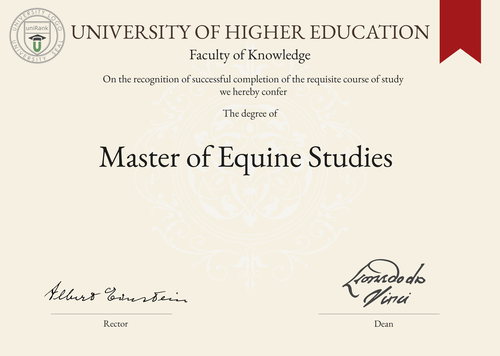
Master of Equine Studies (M.Eq.S.)
Guide to Master of Equine Studies Program/Course/Degree
Master of Equine Studies (M.Eq.S.)

Program Name
Master of Equine StudiesProgram or Degree abbreviation
M.Eq.S.Duration range
The duration of the Master of Equine Studies program can vary depending on the country or university, typically ranging from 1 to 2 years.Tuition range
The tuition fees for the Master of Equine Studies program can vary depending on the country or university, typically ranging from $10,000 to $30,000 per year.Overview
The Master of Equine Studies program is designed to provide students with advanced knowledge and skills in the field of equine studies. It offers a comprehensive understanding of equine science, management and husbandry practices.Curriculum Overview by year
The curriculum of the Master of Equine Studies program is structured to cover various aspects of equine studies. The specific courses and their order may vary depending on the university, but typically include: Year 1: - Equine Anatomy and Physiology - Equine Nutrition - Equine Health and Disease Management - Equine Reproduction - Equine Exercise Physiology - Equine Behavior and Welfare Year 2: - Equine Business Management - Equine Genetics and Breeding - Equine Rehabilitation and Therapy - Equine Sports Medicine - Equine Facility Design and Management - Equine Research MethodsKey Components
The key components of the Master of Equine Studies program include in-depth knowledge of equine science, practical skills in equine management, understanding of equine health and welfare and the ability to apply research methods in the field of equine studies.Career Prospects
Graduates of the Master of Equine Studies program can pursue various career paths in the equine industry. Potential career prospects include: - Equine facility manager - Equine nutritionist - Equine health and welfare specialist - Equine research scientist - Equine consultant - Equine event organizerSalary Expectations
The salary expectations for individuals with a Master of Equine Studies degree can vary depending on factors such as job position, location and level of experience. On average, professionals in the equine industry can earn salaries ranging from $40,000 to $80,000 per year. For a more accurate understanding of salary expectations, you can utilize the Job Sites Search Engine, from our sister site jobRank, which searches over 4,600 job sites worldwide. Make sure to specify not only the job title but also the country you are interested in.Conclusions:
It is important to note that the duration, tuition fees, curriculum, key components, career prospects and salary expectations of the Master of Equine Studies program can vary depending on the chosen country or location of study, as well as the chosen university. Prospective students are advised to research and compare different programs and universities to find the best fit for their academic and career goals. Visitors interested in pursuing a Master of Equine Studies degree can search for universities offering this program worldwide through the uniRank World Universities Search Engine. This search engine provides a comprehensive database of universities and their programs, allowing individuals to explore their options and make informed decisions about their education.World Universities Search Engine
search for Master of Equine Studies (M.Eq.S.) and add the Location (country, state etc.) or specific University you are interested in studying at.
Query examples:
- Master of Equine Studies (M.Eq.S.) United States
- Master of Equine Studies (M.Eq.S.) United Kingdom online
- Master of Equine Studies (M.Eq.S.) Australia international students
- Master of Equine Studies (M.Eq.S.) University of California
- Master of Equine Studies (M.Eq.S.) University of London tuition fees
- Master of Equine Studies (M.Eq.S.) University of Sydney scholarships
Share Program/Course
Interesting? Share this program/course/degree info with your friends now.